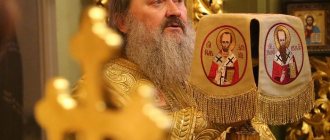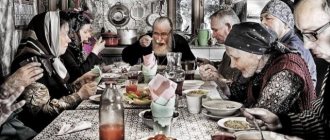What is death
Due to the exorbitant development of atheism and unbelief, death for most modern people, as a rule, is presented in the form of the complete death of a person. “A man lived, lived and... bam - he is completely gone, disappeared forever, forever,” - this is what atheism teaches, which does not recognize the doctrine of the immortality of the human soul.
Therefore, an atheist and a simple non-believer are afraid of death in every possible way and try to avoid it, although nothing more insane can be imagined. After all, death is the inevitable outcome of any person’s life; it is impossible to avoid it. You can only delay her arrival for a while, and even this is quite problematic.
Meanwhile, the atheist’s opinion that after people’s lives their complete non-existence begins has absolutely no basis. But it rests only on the absurd and blind faith of the atheist himself. Just as a Christian believes in the immortality of the soul, just as an atheist, on the contrary, believes in its mortality after the death of the body.
Let us evaluate these two faiths from a logical point of view. Christianity encourages us to believe that the soul, being immortal, does not die after the death of a person, but continues to live in rebirth. Atheism makes us believe that the soul supposedly also dies along with the body, and after that we will never exist again. Isn’t that very “optimistic”?! What should we believe?
Even if we assume that both of these beliefs are equally probable in relation to the truth, then their relationship can be clearly depicted as follows. There are, as it were, two roads in front of us: the sign of one says, if you follow this path, you will definitely die (as atheism claims); the second pointer is that by following this path you will perhaps be saved and finish your journey safely.
Which way should a normal person go?! Of course, the second one, which promises salvation, and not certain death. But, unfortunately, now, more than ever, “wide is the gate and broad is the way that leads to destruction, and many go through it; For strait is the gate and narrow is the way that leads to life, and few find it” (Matthew 7:13-14).
However, in any case, a Christian should believe that death is not the complete destruction of a person, but only the separation of soul and body. The latter goes into the earth from which it was taken (Gen. 3: 19), and the soul is immortal, and therefore remains in eternity.
Evidence of the immortality of the soul
As for the atheist, he cannot provide any evidence of his false teaching about the mortality of the soul. His pathetic chatter on this matter “about the achievements of science” is not worth a damn, since science has not dealt with this issue. Although recently, on the contrary, it has presented some evidence from people who have experienced clinical death that there is another, spiritual life after death.
But Christianity can point to the obvious fact that all humanity, and always, with the exception of the relatively short time of widespread atheism (the twentieth and the beginning of our twenty-first centuries), believed that the soul is immortal. True, this faith was expressed in different forms, sometimes quite far from Christianity, but it almost always existed.
Modern science, studying myths, fairy tales, and beliefs of the ancients, has come to the conclusion that there is some kind of reality behind all this. Obviously, such a widespread belief in the posthumous existence of the soul suggests that it is truly immortal.
Today's people can understand this, and what death is, in the following way. Nowadays computers are very common and many people use them. But at the same time, a distinction is made between this device itself, which is sometimes called “hardware,” and its software. And what’s interesting is that the latter turns out to be, in a certain sense, independent of the former.
So, for example, the computer itself sometimes gets destroyed for some reason, but its software may well exist without hardware, but on a different medium. As we see, it is very similar to human death: the body is destroyed, but the immortal soul continues to exist in another world.
There is another similar example that Christians sometimes give. A baby, when it is conceived and lives for nine months in its mother’s womb, they say, believes that this existence is its real being. When the time of birth comes, he perceives this as the end of this existence, i.e. death. But in fact, as we all know, the birth of a person opens the door to another, much more extensive and attractive world than the cramped womb! Likewise, our physical death is also a door to another, immeasurably larger world, to rebirth.
However, as Christianity teaches, the fate of each of us there is different - depending on the faith and moral deeds of the person himself, committed during his earthly life. This is where the Orthodox virtue comes from, which is called
Mortal memory
Unlike an atheist, a true Christian is not afraid of death, knowing that another life follows after it. But he is afraid of God's judgment for his earthly deeds. Therefore, he tries to live piously, according to God’s commandments, in love for his neighbor, doing good deeds of mercy.
This virtue forces him to do this, called mortal memory, i.e. the constant memory that sooner or later, perhaps even this day, he will die, and with his good and evil deeds he will appear before the judgment of God. Which makes him do good, avoiding sinful deeds. As the holy fathers said:
“Remember your last - and you will never sin.”
It’s a different matter for an atheist, who, as mentioned above, is insanely afraid of death, which, after all, will come someday anyway. But at the same time, not believing in retribution from beyond the grave, he is not afraid to do evil, and often even the most notorious and disgusting sins. At the same time, trampling and hurting your neighbor in every possible way.
Let's compare one with the other and think - which is better?!
General rules for funerals
Orthodox Christians organize funerals to pay tribute to a deceased relative. People remember the good deeds a person did during his lifetime and note his positive qualities. At a wake, you should never make a scandal, argue or quarrel. Negative emotions of relatives and friends, as they say, can complicate the path of the soul of the deceased to a better world.
For the same reason, sobs, despair and loud regrets about the departure of a loved one are inappropriate. In the Orthodox tradition, death is considered an inevitable and natural outcome of life; it is not a tragedy at all. Believers believe that a good person should not fear God's judgment. Therefore, at a wake it is customary to behave calmly, restrainedly and kindly.
A joint meal brings together relatives, friends and colleagues of the deceased. It is not allowed to send out invitations to funerals. It is believed that everyone to whom this is important should inquire about the place and time of this event themselves. But it is not forbidden to casually mention in a conversation the efforts that relatives are busy with regarding the organization of a funeral meal. This will tell the person that he should come if he himself considers it necessary to attend this event.
Despite Russian table traditions, Orthodox funerals do not involve the consumption of alcoholic beverages. Although this rule is often violated, because the popular ideas about a worthy send-off of the deceased to another world in this matter do not coincide with religious canons. But in any case, the wake should not turn into a banal drinking session, because this is a sacred event, and not a reason for fun and dancing.
As a rule, it is customary to dress modestly at a wake, in dark-colored clothing. Scarves are required for women. If the deceased was an elderly person, then the relatives of the deceased mourn for 40 days from the moment of his death. Young people who tragically passed away - husbands, wives, children - are mourned for up to 1 year, all this time adhering to dark tones in clothing.
What happens to the soul after death
What do the 1st, 3rd, 9th and 40th days mean and how to spend them correctly
Immediately after it, on the first day, the soul of any deceased person experiences relief, freed from the bonds of the flesh. Especially if this, as often happens, was preceded by a more or less prolonged illness. But then the feeling of the soul of a true Christian is different, who is joyfully convinced of the justice of his faith and has hope in salvation by the grace of God.
The soul of an atheist feels differently, who sees with his own eyes the falsity and futility of his belief in the death of the soul and trembles, awaiting the inevitable judgment of God, for which he is completely unprepared.
3rd day
However, both on this day and subsequently, to a certain extent, can be supported by the funeral prayers of relatives for them, both personal and church. These prayers are especially important on the 3rd day, when the soul of the deceased first comes before the throne of God, and when heaven and hell are shown to it... Therefore, on this day, a Christian funeral service for the deceased and his burial are usually performed.
9th day
On the 9th day after death, a memorial service is performed so that the soul of the deceased is numbered among the nine ranks of angels.
40th day
The most important, however, is the 40th day after death. Before this or on this day (there are different opinions of different theologians) the soul passes, i.e. tested at various ordeals. Where on the scales of God's justice her virtues and sins are weighed - which will outweigh?! If the first ones outweigh, they will go to heaven; outweigh the latter - he will go to hell! And on this fortieth day she again stands before the throne of God, where she hears her final sentence.
This is the most important day in the life of every person. Therefore, it is so important to support the soul of the deceased with church prayer - a memorial service. It should be done on this very day or, if circumstances do not allow it, then a day earlier. There will be a funeral service later on this day, and not on the 40th day, since God’s judgment has already been completed. The same applies to the funeral dinner, which will be discussed in more detail below.
What should relatives do on the 40th day after the death of a loved one?
Commemoration in the temple
What should relatives do during these forty days and, especially, on the fortieth? As already mentioned, perform church and personal funeral prayers for the deceased. Namely: submit notes for funeral liturgies; funeral services; parastases. It is also good to read the Psalter for the deceased before burial. Which has spell power, i.e. drives demons away from the soul of the deceased. Usually an experienced church reader is hired for this.
But the most powerful commemoration is at the liturgy. Because a piece of prosphora, taken out with the name of the deceased, is then washed with the Blood of Christ, which also washes away the sins of the deceased. Therefore, it is advisable to order a funeral liturgy for him on the 40th day, and then serve a memorial service.
Memorial service
Moreover, relatives can order and celebrate the Divine Liturgy in the church, and then serve a memorial service at the grave of the deceased. This is what they do quite often.
Is the birthday of the deceased celebrated?
Our ancestors never celebrated the birthday of the deceased. If a person died on his birthday, then the date of birth was not marked in any way. Remembering the soul on its birthday, relatives involuntarily pull it to the ground, that is, they do not give peace to the deceased.
Dear friends, the Orthodox Church recommends that on the birthday of a deceased relative or parent you go to the cemetery, where you can give out alms, but not organize gatherings. Gatherings with alcohol cause suffering to the soul of the deceased.
You cannot pour alcohol on a grave, it insults the deceased. Let us honor Orthodox traditions too.
How to throw a funeral dinner
On this day, relatives and friends of the deceased usually organize a dinner in his memory. It should be said that this is another type (along with prayer) of serving the soul of the deceased, namely, alms for him. Only here you need to follow some simple rules.
Firstly, such a dinner should be held decently, without excessively strong drinks and indecent, stupid laughter, which usually occurs after their excessive consumption. Secondly, from time to time relatives should remember and encourage other diners to remember the deceased for the repose of the deceased, and also ask for their prayers for him in the future. Then such a memorial dinner will do him good.
Thirdly, almsgiving should not be limited to just this lunch. If possible, you should give a penny to the poor with the words: “For the repose of God’s servant (name),” then this alms will be counted as a virtue to both the deceased and the one who gave it.
Some people wonder what can be prepared for a funeral dinner? The answer is very simple - you can cook any dishes, there are no restrictions on meals. But there is a tradition of serving on the table exactly those dishes that the deceased or deceased loved during his lifetime.
If the commemoration falls on a fast day according to the Orthodox calendar, then it is better to abstain from meat dishes, replacing them with fish, cereals, vegetables and fruits.
Godins. How to celebrate?
A year later, on the day of death, relatives and friends gather again for a memorial meal. They remember the righteous deeds that the deceased performed in his life and express condolences.
According to Orthodox canons, only people who have undergone the rite of Baptism are commemorated. The Church does not pray for the unbaptized, suicides, non-Orthodox, heretics. The unbaptized, after saying goodbye to the place where he lived, is taken to the cemetery, bypassing the Church.
How to mark a death anniversary
On the anniversary of death, they always visit the cemetery, then gather in a close family circle. It is advisable to arrive at the cemetery before 12:00. You can give out alms - these are sweets, pies, good things of the deceased.
Wreaths made from fake flowers were banned by the Synod back in the last century. In Christianity, it is forbidden to bring anything to a grave. You can light candles and lay fresh flowers.
Any anniversary of death is held only for the closest people. A leisurely, calm atmosphere, even quiet music is possible, photographs on the table are a worthy way to honor the memory. Often the meal is spent at home, but it is also possible in a cafe.
Brief and complete prayer for the deceased on the 40th day
It should be remembered that a person passes into another world with the baggage of virtues and sins that he committed during life. After death, as a rule, he cannot add anything to this baggage, because he can no longer do good or evil (with the rare exception of subsequent sins).
But relatives can do prayers and good deeds in his memory. And all this is put on that scale of God’s justice, where the goods of the deceased himself lie. And this cup, according to their zeal, can outweigh. And the one who on the first day after death would have been condemned to hell, on the fortieth day, thanks to these prayers and alms of relatives and friends, is awarded heaven.
And even if the sins of our loved ones are so grave that we cannot pray for them, then in this case their hellish punishment, according to our prayers and alms, will be less. And if we couldn’t pray for them in forty days, then perhaps we can pray for them for the rest of our lives, during which, if possible, we need to pray for them!
Constant personal prayer for our deceased loved ones should be like this:
“Rest, O Lord, the soul of Your departed servant (name).”
You can read a more extensive prayer for the deceased on the 40th day:
Remember, O Lord our God, in the faith and hope of the life of Thy eternal newly departed servant (or Thy servant), the name, and as good and a lover of mankind, forgiving sins and consuming iniquities, weaken, forsake and forgive all his voluntary and involuntary sins, exposing him to Thy holy second coming into the communion of Thy eternal blessings, for the sake of the One who has faith in Thee, the true God and Lover of mankind. For You are the resurrection and the life and the rest of Your servant, named Christ our God. And we send glory to You, with Your beginningless Father and with the Most Holy Spirit, now and ever and unto ages of ages, Amen.
On this fortieth day, it is advisable, if possible, to constantly pray with this prayer for the deceased, while avoiding all vain affairs and unnecessary gossip that only distract from prayer. And, of course, it is completely indecent, as has already been said, stupid drunken laughter, as well as irritation, anger, and scolding of relatives who, sometimes, are deprived of the inheritance of the deceased. All this certainly insults his memory!
I dreamed about a deceased relative: what does this mean?
Usually superstitions on this basis also include dreams involving the deceased, especially on the 40th day. It should be noted that our dreams happen for three reasons: from God; from demons and from the flesh. The first occur rarely and on special occasions; the second - more often, the third even more often. So usually such a dream is either from demons or from the flesh. Therefore, you should not believe these dreams, and especially not be afraid because of them. In general, we should not believe any of our dreams, because such faith is most often, as has already been said, ordinary superstition!
If the dream is from God, then He will not be offended by our reasonable unbelief, but, on the contrary, will praise us. And if He wants to somehow enlighten us with such a dream, then He will repeat it a second and even a third time. This is where you need to think, turn to a priest or elder for advice: what does this dream mean? Sometimes dreams really are prophetic, in particular, when our relative from that world wants to warn us about something and warn us against something. But here, as has already been said, the advice of a spiritual person is needed.
Interesting fact
It is interesting to note that for Catholics, according to their tradition, the special day of remembrance is not the fortieth, but the thirtieth day after death. And Muslims, for example, of Tatarstan are still arguing about the commemoration in the 3rd; 7th and 40th days after death.
Our dead will not leave us in trouble...
It happens that the son who has left himself sends rich parcels and transfers to his parents. There are many examples in the history of the Church when prayerful communication with the departed helped the living solve their earthly problems. Here are some examples.
One priest's wife, whom he loved very much, died. The bitterness of the loss was too much for him to bear, and he began to drink. Every day he remembered her in his prayers, but he sank deeper and deeper into the quagmire of alcoholism. One day a parishioner came to this priest and told her that his dead wife appeared to her in a dream and said: “Pour me some vodka.” “But you never drank during your life,” the parishioner was surprised. “My husband taught me this with his current drunkenness,” answered the deceased.
This story shocked the priest so much that he quit drinking forever. He subsequently became a monk. He died in the rank of bishop. His name was Vladyka Vasily (Rodzianko).
Another case. A student at the Theological Academy took the exam without knowing the material well enough. In the corridor on the wall hung portraits of scientists and theologians who taught at the academy over the years. The student prayerfully turned to one of the long-deceased teachers with a request to help him pass the exam. And I remembered for the rest of my life how obvious this help was. He passed the exam with excellent marks, all the time feeling the calm, benevolent support of the one to whom he turned. The student also became a monk, and then a bishop. This is Bishop Evlogy, Archbishop of Vladimir and Suzdal. And the portrait depicted the MDA teacher, Metropolitan Philaret (Drozdov), who was later canonized as St. Philaret of Moscow (by the way, Bishop Eulogius told this story when the Synod was collecting materials for the canonization of St. Philaret).
An amazing case of prayerful communication with the departed is described by Metropolitan Anthony of Sourozh. One day he was approached by a man who, during the war, accidentally shot his beloved girl, his fiancée. With one shot, he destroyed everything they had dreamed so much about together. A happy life after the war, the birth of children, study, his favorite job... He took all this not from someone, but from the closest and dearest person on earth. This unfortunate man lived a long life, repeatedly repented of his sin before the priests in confession, a prayer of absolution was read over him, but nothing helped. The feeling of guilt did not go away, although almost sixty years had passed since that ill-fated shot. And Vladika Anthony gave him unexpected advice. He said: “You asked forgiveness from God, whom you did not harm, you repented before the priests, whom you did not kill. Now try to ask forgiveness from this girl herself. Tell her about your suffering, and ask her to pray to the Lord for you.” Subsequently, this man sent a letter to the Vladyka, where he said that he did everything as he ordered and the icy splinter of guilt that had been sitting in his heart for many years finally melted. The prayer of the bride he killed turned out to be stronger than his own prayers.
And Metropolitan Anthony himself told how, in difficult moments of his life, he turned to his deceased mother with a request to pray for him, and many times received the expected help.
Vladimir Vysotsky once sang: “...Our dead will not leave us in trouble, our fallen are like sentries.” By leaving this life, our loved ones become closer to the Lord and can intercede for us before Him. That is why we pray to the saints who are canonized by the Church. But we must not forget that the Church considers saints not only the glorified saints of God included in the calendar. All Christians who are sanctified by the Most Pure Body and Blood of Christ in the sacrament of the Eucharist are called saints in the Church. And if our loved one was a member of the Church during his lifetime, confessed and partook of the Holy Mysteries of Christ, then we cannot have sufficient grounds to believe that after his death he needs our remembrance more than we need his prayers for us. Saint Cyprian of Carthage wrote: “...We should not mourn our brothers who, at the call of the Lord, renounce the present age. We must rush after them with love, but in no way complain for them: we must not put on mourning clothes when they have already put on white vestments.”
What's next?
So, the one who reads this can easily understand how useful mortal memory is for a Christian during life, freeing him from the fear of death. But it gives hope for future eternal life and forces us to work here on earth for the sake of acquiring it in the Kingdom of God. And how harmful for an atheist is his unfounded belief in the mortality of the soul, depriving him of hope for a future rebirth and always, throughout his entire earthly life, keeping him under the murderous aim of the absurd fear of death.
But even after their death, their fate is even more different. A Christian goes into the future life with true, Orthodox faith and many good deeds that he has done, while an atheist, as a rule, is completely deprived of all this. Moreover, a Christian has the same believing relatives and friends who remember him in the above manner, making up for his unworthiness and atonement for his sins.
And an atheist can only wish that, by the grace of God, he had such relatives! But even then his fate will most likely be sad.
So what will we choose?!
Archpriest Georgy Gorodentsev
Tears flying to the sky
The feelings we experience when a loved one dies were perfectly expressed in his “Ballad of a Smoky Car” by the poet Alexander Kochetkov.
How painful, dear, how strange, Foliage merging, intertwining roots. How painful, dear, how strange Splitting under the saw... The wound on the heart will not heal, It will shed pure tears. The wound on the heart will not heal, It will spill with fiery resin...
Death always encroaches on what is most precious - the unity of our love. She is trying to tear away from us those who shared our sorrows and hardships, who filled our lives with meaning and joy. We have long grown together with them, they have become an inseparable part of us. And now, praying for the dead, we protest, we simply refuse to recognize the legality of this division of loved ones into the living and the dead. God did not create death, and it has neither power nor right over our loved ones, because with God everyone is alive.
The flames of the candles that we light at a memorial service resemble tears in shape. But a tear drips to the ground, and the candle flame always strives upward. We bury our loved ones in their graves, and direct our hearts to heaven, to Christ and ask Him to take care of those who are so dear to us. And they, perhaps, ask God to take care of us here. This unity of mutual love in Christ of dead and living people is the Church of Christ.
In the same poem by Alexander Kochetkov there are also the following words:
Don't part with your loved ones, Don't part with your loved ones, Don't part with your loved ones, Grow into them with all your blood!
Orthodox Christians do not part with their loved ones even after their death. Every day, remembering the departed in our morning and evening prayers, we fit them into the circle of our lives. It’s as if they suddenly left for a distant land, and we just haven’t seen them for a long time. But at the same time, we hope, we really believe that someday we will definitely meet those whom we love so much, and who love us so much...
Because God loves us all.
Magazine "Foma", No. 8/40
Funeral prayers
Prayer for the repose of the father
Lord Jesus Christ our God! You are a keeper of the orphans, a refuge for those who mourn, and a comforter for those who cry.
I come running to you, orphan, groaning and crying, and I pray to you: hear my prayer and do not turn your face away from the sighs of my heart and from the tears of my eyes. I pray to You, merciful Lord, satisfy my grief over separation from my parent (name), who gave birth and raised me, and his soul, which has gone to You with true faith in You and with steadfastness with hope in Your love for mankind and mercy, accept us into Your Kingdom of Heaven .
I bow before Your holy will, which was taken away from me, and I ask You not to take away Your mercy and kindness from him. We know, Lord, for You are the Judge of this world, You punish the sins and wickedness of the fathers in children, grandchildren and great-grandchildren, even up to the third and fourth generation: but you also have mercy on the fathers for the prayers and virtues of the for them, grandchildren and great-grandchildren. With contrition and tenderness of heart, I pray to You, merciful Judge, do not punish with eternal punishment the deceased, unforgettable for me, Your servant, my parent (name), but forgive him all his sins his voluntary and involuntary, in word and deed, knowledge and ignorance created by him in his life here on earth, and according to Your mercy and love for mankind, prayers for the sake of the Most Pure Mother of God and all the saints, have mercy on him and deliver him from eternal torment.
You, merciful Father of fathers and children! Grant me, all the days of my life, until my last breath, not to cease to remember my deceased parent in my prayers, and to beg Thee, the righteous Judge, to put him in order with brighter, in a cooler and calmer place, with all the saints , from here all sickness, sorrow and sighing will escape.
Merciful Lord! Accept this day for Your servant (name) my warm prayer and reward him with Your reward for the labors and care of my upbringing in faith and Christian piety, as He taught me. Most of all, lead You, your Lord, in reverence to pray to You, in You alone I will trust troubles, sorrows and illnesses and keep Your commandments; for his concern for my spiritual success, for the warmth of the prayers he brings for me before You and for all the gifts he asked me from You, reward him with Your mercy, Your heavenly blessings and joy me in Thy eternal Kingdom.
For You are the God of mercies and generosity and love for mankind, You are the peace and joy of Your faithful servants, and we send glory to You with the Father and the Holy Spirit, now and ever and unto the ages of ages . Amen.
Prayer for the deceased mother
Lord Jesus Christ our God! You are a keeper of the orphans, a refuge for those who mourn, and a comforter for those who cry.
I come running to you, orphan, groaning and crying, and I pray to you: hear my prayer and do not turn your face away from the sighs of my heart and from the tears of my eyes. I pray to You, merciful Lord, satisfy my grief over separation from my mother (name), who gave birth and raised me, and her soul, which has gone to You with true faith in You and with you With great hope in Your love for mankind and mercy, accept us into Your Kingdom of Heaven .
I bow before Your holy will, which was taken away from me, and I ask You not to take away Your mercy and kindness from me. We know, Lord, for You are the Judge of this world, You punish the sins and wickedness of the fathers in children, grandchildren and great-grandchildren, even up to the third and fourth generation: but you also have mercy on the fathers for the prayers and virtues of the for them, grandchildren and great-grandchildren. With contrition and tenderness of heart, I pray to You, merciful Judge, do not punish with eternal punishment Your deceased servant, unforgettable for me, my mother (name), but forgive her all her sins her voluntary and involuntary, in word and deed, knowledge and ignorance created by her in her life here on earth, and according to Your mercy and love for mankind, prayers for the sake of the Most Pure Mother of God and all the saints, have mercy on her and deliver eternal torment.
You, merciful Father of fathers and children! Grant me, all the days of my life, until my last breath, not to cease to remember my departed mother in my prayers, and to beg Thee, the righteous Judge, to order you in the place of your ashes, in a cooler and calmer place, with all the saints , from here all sickness, sorrow and sighing will escape.
Merciful Lord! Accept this day for Thy servant (name) my warm prayer and reward her with Thy reward for the labors and care of my upbringing in faith and Christian piety, which taught me Most of all, lead You, your Lord, in reverence to pray to You, in You alone I will trust troubles, sorrows and illnesses and keep Your commandments; for her concern for my spiritual success, for the warmth of her prayers for me before You and for all the gifts she asked me from You, reward her with Your mercy, Your heavenly blessings With joys and joys in Your eternal Kingdom.
For You are the God of mercies and generosity and love for mankind, You are the peace and joy of Your faithful servants, and we send glory to You with the Father and the Holy Spirit, now and ever and unto the ages of ages . Amen.
Children's prayer for deceased parents
Lord Jesus Christ our God! You are a keeper of the orphans, a refuge for those who mourn, and a comforter for those who cry.
I come running to you, orphan, groaning and crying, and I pray to you: hear my prayer and do not turn your face away from the sighs of my heart and from the tears of my eyes. I pray to You, merciful Lord, quench my grief over separation from my parents (their names), who gave birth and raised me, and their souls, who have gone to You with true faith in You and with firm hope I wait for Your love for mankind and mercy, accept me into Your Kingdom Heavenly.
I bow before Your holy will, which was taken away from me, and I ask You not to take away Your mercy and kindness from them. We know, Lord, for You are the Judge of this world, You punish the sins and wickedness of the fathers in children, grandchildren and great-grandchildren, even up to the third and fourth generation: but you also have mercy on the fathers for the prayers and virtues of the for them, grandchildren and great-grandchildren. With contrition and tenderness of heart, I pray to You, merciful Judge, do not punish with eternal punishment your departed unforgettable servants, my parents (names), but forgive them all sins and them, voluntary and involuntary, in word and deed, knowledge and ignorance, created by them in their lives here on earth, and according to Your mercy and love for mankind, prayers for the sake of the Most Pure Mother of God and all the saints, have mercy on them and deliver them from eternal torment.
You, merciful Father of fathers and children! Grant me, all the days of my life, until my last breath, not to cease to remember my departed parents in my prayers, and to beg Thee, the righteous Judge, to put them in order in a brighter place, in a cooler and calmer place, with all the saints , from here all sickness, sorrow and sighing will escape.
Merciful Lord! Accept this day for Your servants (names) my warm prayer and reward them with Your reward for the labors and care of my upbringing in faith and Christian piety, as those who taught me the same most eagerly lead You, your Lord, in reverence to pray to You, in You alone I place my trust troubles, sorrows and illnesses and keep Your commandments; for their concern for my spiritual success, for the warmth they bring for me, prayers before You and for all the gifts they asked me from You, reward them with Your mercy, Your heavenly blessings and joys in Your eternal Kingdom.
For You are the God of mercies and generosity and love for mankind, You are the peace and joy of Your faithful servants, and we send glory to You with the Father and the Holy Spirit, now and ever and unto the ages of ages . Amen.
Widower's prayer for his dead wife
Christ Jesus, Lord and Almighty! In contrition and tenderness of my heart I pray to You: rest, O Lord, the soul of Your departed servant (name), in Your Heavenly Kingdom. Lord Almighty! You blessed the marital union of husband and wife, when you said: It is not good for man to be alone, let us create for him a helper for him. You have sanctified this union in the image of the spiritual union of Christ with the Church. I believe, Lord, and I confess that You have blessed You to unite me in this holy union with one of Your handmaids. It was your good and wise will that you deigned to take away from me this servant of yours, whom you gave to me as a helper and companion of my life. I bow before Your will, and I pray to You with all my heart, accept my prayer for Your servant (name), and forgive her, even if you sin in word, deed, thought, knowledge and ignorance; Love earthly things more than heavenly things; If you care more about the clothing and adornment of your body than about the enlightenment of the clothing of your soul; or even careless about your children; If you upset someone by word or deed; If there is a grudge in your heart against your neighbor or condemn someone or something else that such evil ones have done. Forgive her all this, for she is good and philanthropic; for there is no man who will live and not sin. Do not enter into judgment with Your servant, as Your creation, do not condemn her to eternal torment for her sin, but have mercy and mercy according to Your great mercy. I pray and ask You, Lord, to grant me strength throughout the days of my life, without ceasing to pray for Your departed servant, and even until the end of my life, to ask for her from You, the Judge of the whole world, forsaking her sins. Yes, because You, God, have placed a crown of honor on her head, crowning her here on earth; So crown me with Your eternal glory in Your Heavenly Kingdom, with all the saints who rejoice there, so that together with them He may forever sing Your all-holy name with the Father and the Holy Spirit Home Amen.
Widow's prayer for her deceased husband
Christ Jesus, Lord and Almighty! You are the consolation of the weeping, the intercession of the orphans and widows. You said: call on Me in the day of your tribulation, and I will destroy you. In the days of my sorrow, I resort to You and pray to You: do not turn Your face away from me and hear my prayer, offered to You with tears. You, Lord, Master of all, have deigned to unite me with one of Your servants, so that we may be one body and one spirit; You gave me this servant as a companion and protector. It was your good and wise will to take away this servant of yours from me and leave me alone. I bow before Your will and I resort to You in the days of my sorrow: quench my sorrow about separation from Your servant, my friend. Even if you took him away from me, do not take your mercy away from me. As you once accepted two mites from widows, so accept this prayer of mine. Remember, Lord, the soul of Your departed servant (name), forgive him all his sins, voluntary and involuntary, whether in word or deed, whether through knowledge or ignorance, do not destroy him without cause. horse him and do not deliver him to eternal torment, but according to the greatness of Your mercy and according to the multitude of Your bounty, weaken and forgive all his sins and do it with Your saints, where there is no sickness, no sorrow, no sighing, but endless life. I pray and ask You, Lord, grant that all the days of my life I will not cease to pray for Your departed servant, and even before my departure, ask You, the Judge of the whole world, for the forgiveness of everything. his sins and his entry into the heavenly abodes, which you have prepared for those who love Ty. Even if you sin, do not depart from You, and undoubtedly the Father and the Son and the Holy Spirit are Orthodox even until your last breath of confession; Moreover, his faith, even in Thee, instead of works was imputed to him: for there is no man who will live and will not sin, You are the only one besides sin, and Your righteousness is righteousness forever. I believe, Lord, and I confess that You will hear my prayer and will not turn Your face away from me. Seeing the widow weeping, you were moved with compassion, and you raised up her son for the burial of the son: so having mercy, calm and calm my sorrow. For You opened the door of Your mercy to Your servant Theophilus, who went to You, and You forgave him for his sins through the prayers of Your Holy Church, heeding the prayers and kindly to the shame of his wife: I pray to You, accept my prayer for Your servant and bring him into eternal life. For You are our hope. You are God, who has mercy and saves, and we send glory to You with the Father and the Holy Spirit. Amen.
Parents' prayer for the repose of their son or daughter
Lord Jesus Christ, our God, Lord of life and death, Comforter of the afflicted! With a contrite and tender heart I run to You and pray to You: remember. Lord, in Your Kingdom of Your departed servant (your servant), my child (name), and create for him (her) eternal memory. You, Lord of life and death, have given me this child. It was your good and wise will to take it away from me. Blessed be Thy name, Lord. I pray to You, Judge of heaven and earth, with Your endless love for us sinners, forgive my departed child all his sins, voluntary and involuntary, in word, in deed, in food and ignorance. Forgive, O Merciful One, our parental sins, so that they may not remain on our children: for we have sinned many times before You, we have not kept many, we have not done what You commanded. m. Even if our deceased child, ours or ours, for the sake of guilt, lived in this life, working for the world and his flesh, and no more for You, the Lord and your God: if you have loved the delights of this world , and not more than Thy Word and Thy commandments, even if delivered the sweets of life, and not more than the contrition for one’s sins, and in intemperance, vigil, fasting and prayer have been given over to oblivion - I pray to Thee earnestly, forgive me, most gracious Father, my child, all of these are forgive and forgive his sins, even if you have done other evil things in this life . Christ Jesus! You raised up the daughter of Jairus through the faith and prayer of her father. You healed the daughter of the Canaanite wife through faith and the request of her mother: hear my prayer, and do not despise my prayer for my child. Forgive, Lord, forgive all his sins and, having forgiven and cleansed his soul, eradicate eternal torment and place him with all Your saints, who have pleased You from time immemorial, where there is no sickness or pain al, not sighing, but endless life: like there is no man like He will live and will not sin, but You are the only One besides all sin: so that when you judge the world, my child will hear Your most beloved voice: come, you blessed of My Father, and I will inherit Take the kingdom prepared for you from the foundation of the world. For You are the Father of mercies and generosity. You live and our resurrection, and we send glory to You with the Father and the Holy Spirit, now and ever and unto the ages of ages. Amen.
Mom's hand
Saint Ignatius Brianchaninov called the existence of the soul in hell - being without being, a strange form of life in the absence of life. Strangely enough, we have all experienced this inability of the sinful soul to act to varying degrees already now, during our lifetime. Probably, any person has at least once experienced a state of deep depression and despondency. When you lie on the sofa, turned to the wall, and you don’t want to see or hear anyone. When even the sunlight interferes with your life, and you run from it, draw the curtains, cover your head with a blanket just so as not to see the darkness that has taken possession of your soul. You haven’t died yet, but you no longer have the strength and desire to live further, and it seems that it will always be like this now. And then your mother will enter your dark room. She won't ask what happened to you and won't even console you. She will just sit on the edge of the sofa, take your hand, stroke your head, start talking about something completely unimportant for either her or you... In general, she won’t do anything special. But you will suddenly feel that the black bag of despondency in which you spent several days is coming apart at the seams, and you are able to live again.
It turns out that love allows us to share with our loved ones the most important thing - vitality, the very possibility of being. On this principle, the Church bases the need to remember the dead, and the possibility of changing the posthumous fate of those whom we love and for whom we pray. Yes, the soul cannot change itself after death. But it can change thanks to the efforts of those who remained on earth and remember it. The fact is that the Church is not just a formal association of people who believe in God. Christians constitute a single organism in the Church, in which the state of one organ determines the well-being of all the others. We are all living cells of the living Body of Christ. The Apostle Paul wrote amazing words about this: “...You are the body of Christ, and separately you are members,” and also: “The eye cannot say to the hand: I do not need you; or just head to feet: I don’t need you.” Physical death does not separate a person from the Body of Christ. But those spiritual illnesses that he did not cure during his lifetime can now be cured only by the effort of the whole organism; he is no longer able to do anything for himself.
How can one person spiritually help another, especially the deceased? Just like in the body one cell helps another that is affected by a disease. To suppress the inflammatory process in one part of the body, the body turns on immune processes, which throw all the body’s forces into fighting the disease. Healthy cells take on extra workload to help sick cells. Thus, in war, soldiers do not abandon a wounded comrade, but carefully carry him out from under fire, risking themselves in the process. So, during a hike, the burden of a person who sprains his leg is distributed among everyone.
But only a healthy person can help a sick person. This is the main principle of spiritual care. This is the essence of prayer for another person, living or deceased - it doesn’t matter. In order to help our neighbor, we ourselves must take care of our spiritual health in order to be able to share it with our loved one. Suppose our neighbor was angry during his lifetime, loved to slander, was a drunken and gluttonous person, and was greedy. This means that we must learn to abstain from anger, control our tongues from evil speeches, observe fasts, give alms, etc. Simply put, we ourselves need to begin to live like a Christian and thereby gain the opportunity to share this life with our departed through prayer. Love realizes itself in sacrifice. And if our commemoration is based on such Christian self-sacrifice, it will become for the soul of a deceased person that very touch of love that can pour into him a part of our life in Christ.











